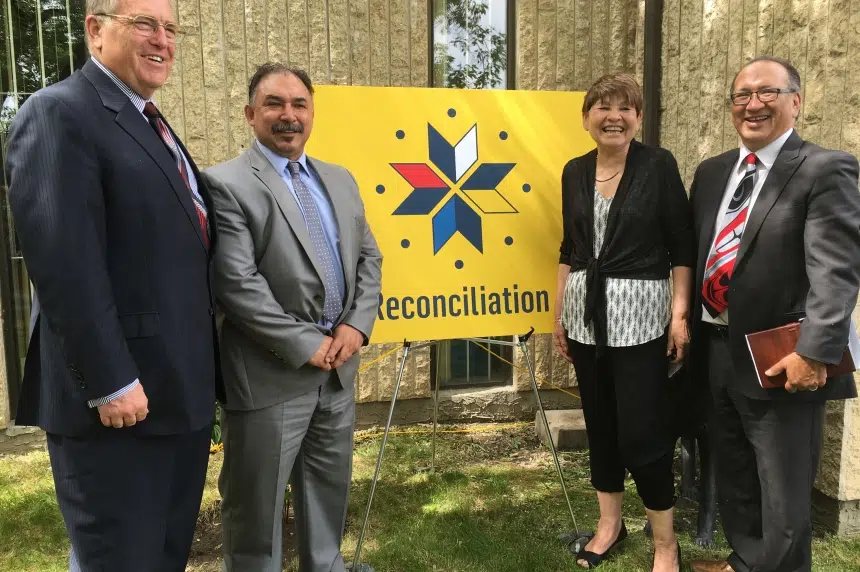The sounds of drumming symbolized the start of a month dedicated to reconciliation between indigenous peoples and all other cultures in the Bridge City.
It’s fitting drummer and singer Bluejay Linklater was the one to perform the song. The 14-year-old’s elders survived the residential school system, and Tuesday, he helped usher in what many hope is the beginning of a time of healing.
Over the next 30 days, he’ll be joined by the Office of the Treaty Commissioner, the Saskatoon Tribal Council (STC), the Central Urban Métis Federation, the city, and 29 other groups and organizations who will host a variety of events designed to promote understanding, reconciliation and cooperation between cultures.
The motto of the campaign is “Listen, Learn, Show Up and Share”. Whether it’s through movies, music, or dancing, every event is geared towards bringing people together to learn about each other. The month culminates in a flag raising ceremony and a walk in Victoria Park on June 22.
Central Urban Métis Federation Incorporated president Shirley Isbister said the events are intended to engage Saskatoon residents and inspire them to find out what reconciliation means and looks like to them.
“Reconciliation is different things for different people and I think we have to find what each of us internally feels reconciliation is,” she said, adding only then can a person go into the community and begin the healing. “I think it’s about all of us coming forward with a welcoming environment and giving people the opportunity to understand us and for us to understand them.”
Last June, following the Truth and Reconciliation Commission, city council unanimously agreed to declare 2015/2016 the year of reconciliation.
The topic hits close to home for Isbister, whose mother-in-law survived residential schools. Today, she said she still sees the ongoing racism and distrust when security guards follow her daughters at shopping malls.
Isbister said she believes the key to a better future for her children and others is about getting to know people.
“Once you build a relationship with someone or have a meal with them, it’s not so easy to say something about that culture,” she said.
STC chief Felix Thomas hopes action extends beyond the month-long event. Following decades of residential school abuse, he said wounds on both sides will take years to heal.
Federation of Saskatchewan Indian Nations vice chief Robert Merasty said the event is about “moving from a culture of exclusion to a culture of inclusion.”
Meanwhile, Isbister stressed the event should not focus solely on indigenous peoples.
“It’s about all cultures,” she said. “It’s not just the residential schools. It’s the other tragedies that others have faced. I’ve always said Saskatoon is so rich in diversity and it’s our job as a community to mine that commodity.”
She encourages others to wear their traditional regalia at the June 22 walk.











